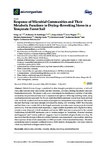Response of Microbial Communities and Their Metabolic Functions to Drying–Rewetting Stress in a Temperate Forest Soil
Liu, Dong
Keiblinger, Katharina M.
Leitner, Sonja
Wegner, Uwe
Zimmermann, Michael
Fuchs, Stephan
Lassek, Christian
Riedel, Katharina
Zechmeister-Boltenstern, Sophie
Global climate change is predicted to alter drought–precipitation patterns, which will likely affect soil microbial communities and their functions, ultimately shifting microbially-mediated biogeochemical cycles. The present study aims to investigate the simultaneous variation of microbial community compositions and functions in response to drought and following rewetting events, using a soil metaproteomics approach. For this, an established field experiment located in an Austrian forest with two levels (moderate and severe stress) of precipitation manipulation was evaluated. The results showed that fungi were more strongly influenced by drying and rewetting (DRW) than bacteria, and that there was a drastic shift in the fungal community towards a more Ascomycota-dominated community. In terms of functional responses, a larger number of proteins and a higher functional diversity were observed in both moderate and severe DRW treatments compared to the control. Furthermore, in both DRW treatments a rise in proteins assigned to “translation, ribosomal structure, and biogenesis” and “protein synthesis” suggests a boost in microbial cell growth after rewetting. We also found that the changes within intracellular functions were associated to specific phyla, indicating that responses of microbial communities to DRW primarily shifted microbial functions. Microbial communities seem to respond to different levels of DRW stress by changing their functional potential, which may feed back to biogeochemical cycles.

